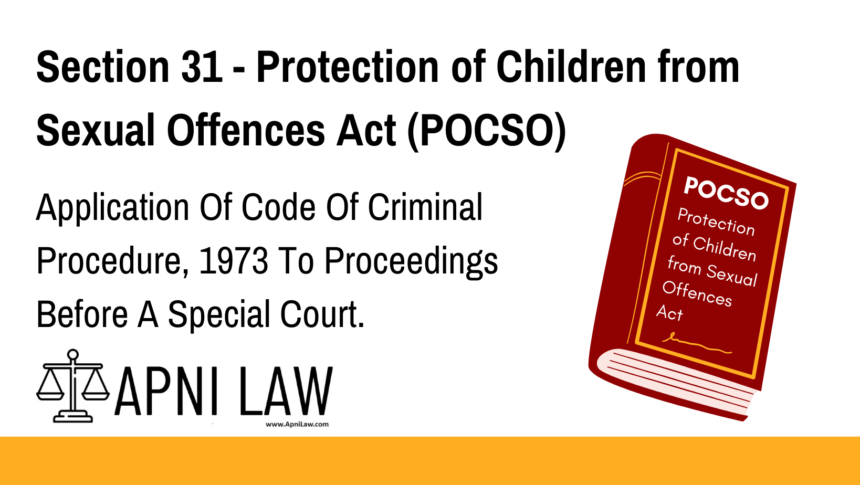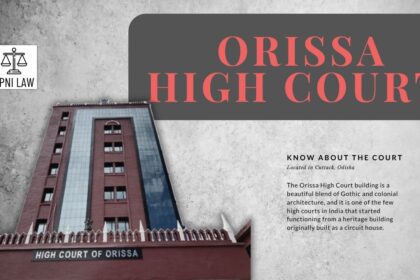Code: Section 31 POCSO Act
Save as otherwise provided in this Act, the provisions of the Code of Criminal Procedure, 1973 (2 of 1974)(including the provisions as to bail and bonds)shall apply to the proceedings before a Special Court and for the purposes of the said provisions, the Special Court shall be deemed to be a court of Sessions and the person conducting a prosecution before a Special Court, shall be deemed to be a Public Prosecutor.
Explanation of Section 31 POCSO
Section 31 of the POCSO Act ensures that the general procedural law governing criminal trials in India—the Code of Criminal Procedure, 1973 (CrPC)—applies to all proceedings held under the POCSO Act before a Special Court. However, this is subject to any specific provisions provided in the POCSO Act itself.
In simpler terms:
- The CrPC will govern how trials are conducted under POCSO.
- This includes processes like filing chargesheets, bail, bonds, summoning witnesses, examining evidence, etc.
- A Special Court under POCSO is treated as a Court of Sessions for all procedural purposes.
- The prosecutor conducting a case in a Special Court is treated as a Public Prosecutor under CrPC.
This integration of POCSO with CrPC ensures procedural consistency, fairness, and adherence to established judicial norms.
Key Provisions
- CrPC Applies: All procedures of the Code of Criminal Procedure apply unless the POCSO Act specifically states otherwise.
- Special Court = Sessions Court: For procedural matters, a Special Court under POCSO is considered equivalent to a Sessions Court.
- Prosecutor = Public Prosecutor: The person conducting the case is deemed to be a Public Prosecutor even if not officially appointed as one under CrPC.
- Bail & Bond: Provisions related to bail and bond under CrPC also apply to proceedings under POCSO.
Illustrations
Illustration 1: Bail Application under POCSO
If an accused applies for bail in a case registered under the POCSO Act, the application will be considered by the Special Court under the bail provisions laid out in the CrPC, such as Section 437 or 439 CrPC.
Illustration 2: Recording of Evidence
The process of summoning and examining witnesses in a POCSO trial follows CrPC procedures, ensuring the accused has the right to cross-examine and the court maintains proper records as per CrPC mandates.
Common Questions & Answers on Section 31 POCSO
1. Does CrPC apply to all POCSO cases?
Yes. Section 31 explicitly states that CrPC provisions apply to proceedings under the POCSO Act, unless the Act itself provides a different procedure.
2. Is the Special Court under POCSO the same as a Sessions Court?
Functionally, yes. For all procedural aspects under CrPC, a Special Court is treated as a Court of Sessions.
3. Can any lawyer appear as a Public Prosecutor in a POCSO case?
Only the person authorized to conduct the prosecution before the Special Court is deemed to be a Public Prosecutor under CrPC for that case.
4. Are CrPC bail provisions applicable to POCSO?
Yes. The CrPC provisions related to bail and bonds are fully applicable to POCSO proceedings unless otherwise stated in the Act.
5. Is there any conflict between CrPC and POCSO procedures?
If there’s any difference, the specific provisions of the POCSO Act will override CrPC, as stated in “Save as otherwise provided in this Act…”
Conclusion
Section 31 of the POCSO Act bridges the special legislation with general criminal procedure by integrating the Code of Criminal Procedure, 1973, into its framework. This ensures that trials under POCSO maintain judicial integrity, due process, and established criminal law protocols. The Special Court’s designation as a Sessions Court further enhances the seriousness and procedural rigor in handling offences against children.
For more such detailed legal breakdowns and expertly formatted content, visit 🔗 ApniLaw – your trusted legal companion!








